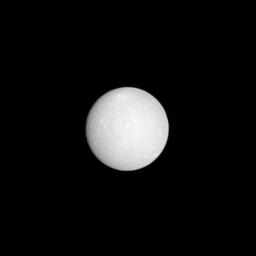
|
Details on Dione
- Click the image above for a larger view
- Full-Res JPEG (561 x 561) (7.5 kB)
- Full-Res TIFF (561 x 561) (315.3 kB)
Caption:
The face of Dione is almost fully lit as the Cassini spacecraft flies in between this moon and the sun with Dione at low phase.
With a few hundred pixels of its digital camera, Cassini details dozens of craters a million kilometers away.
This view was acquired at a distance of approximately 1 million kilometers (620,000 miles) from Dione and at a Sun-Dione-spacecraft, or phase, angle of 9 degrees. Image scale is about 6 kilometers (4 miles) per pixel. Dione, at 1,123 kilometers (about 698 miles) across, is the fourth largest of Saturn's moons.
This view looks toward the trailing hemisphere of Dione. North on Dione is up and rotated 7 degrees to the right. The image was taken in visible light with the Cassini spacecraft narrow-angle camera on Dec. 31, 2008.
Background Info:
The Cassini-Huygens mission is a cooperative project of NASA, the European Space Agency and the Italian Space Agency. The Jet Propulsion Laboratory, a division of the California Institute of Technology in Pasadena, manages the mission for NASA's Science Mission Directorate, Washington, D.C. The Cassini orbiter and its two onboard cameras were designed, developed and assembled at JPL. The imaging operations center is based at the Space Science Institute in Boulder, Colo.
For more information about the Cassini-Huygens mission visit http://saturn.jpl.nasa.gov/ . The Cassini imaging team homepage is at http://ciclops.org .
Cataloging Keywords:
| Name | Value | Additional Values |
|---|---|---|
| Target | Dione | |
| System | Saturn | |
| Target Type | Satellite | |
| Mission | Cassini-Huygens | |
| Instrument Host | Cassini Orbiter | |
| Host Type | Orbiter | |
| Instrument | Imaging Science Subsystem (ISS) | |
| Detector | Narrow Angle Camera | |
| Extra Keywords | Crater, Grayscale, Rotation, Visual | |
| Acquisition Date | ||
| Release Date | 2009-03-05 | |
| Date in Caption | 2008-12-31 | |
| Image Credit | NASA/JPL/Space Science Institute | |
| Source | photojournal.jpl.nasa.gov/catalog/PIA10592 | |
| Identifier | PIA10592 | |
